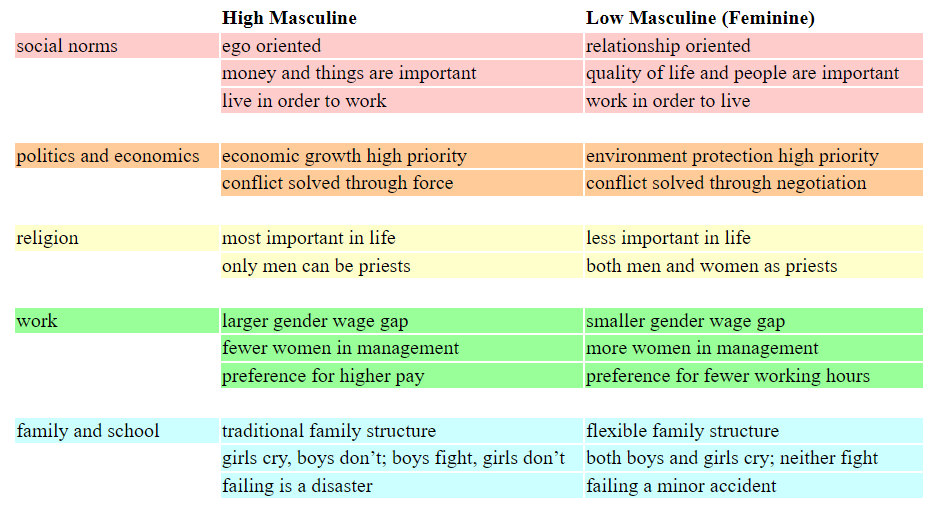Let me open with a statement that this subject turns out to be more challenging than I initially thought. I will start with society and controversy. Expect some harmony and traditional gender roles in another blog entry.
A friend of mine is a trained psychotherapist, one of the good ones. She casually mentioned something that got me thinking: it is easier to turn from feminine to masculine than to go back. Before we were born, we were biologically female, only some of us lost their feminine features and became boys. Now when we look at trans-gender people, all girls-turned-male are convincing, while boys-turned-females still have some masculine features that are hard to lose. Learning how to be masculine is easy, sometimes it is just a matter of introducing some competitiveness into our perspective. Un-learning masculinity is a different story.
My experience of femininity
I did not feel feminine most of my life. I have been told I am feminine, but I could not believe that until someone actually showed me a video of me so that I could see the way I move. There are some things that are so natural to me, I never thought it is possible to feel otherwise. Someone had to point that out to me.
When I googled femininity, I expected a sea of information. After all, this is such a beautiful subject, not to mention, there is feminism. What I found confused me.
- Men’s wishes what they want women to be like – mainly submissiveness and convenient features (looks pretty, cooks well, keeps away from power).
- Women’s instructions on how to enchant your man.
- Articles on feeling good just being yourself.
- Discussions about body-positivity and looks.
- Reports of discrimination in the workplace.
- Problem of slut-shaming.
Is this subject just another means of pushing women around? Or pushing both genders around – after all, a number of qualities identified as feminine are just human features. Men also carry them and denying them these aspects of themselves does not seem fair.
In the twenties (one hundred years ago) classy women were encouraged to deal with hardship by means of narcissistic withdrawal and that stayed with us for a while. Silence can be used to communicate conflict and disagreement. On the other hand this way of communicating is ambiguous and does not feel like bringing resolution. Personally I have little need to say “this is beneath me, I will not grace you with my attention or response”. Still, I can identify some individuals that carry themselves in a very feminine way and are also very narcissistic and exploitative, oftentimes adapting the role of the victim. Are we rejecting authentic femininity and replacing it with “image-related” ideas of what it is supposed to entail?
Part of me wants a traditional gender role.
At the same time, another part of me wants to use my skills in professional life and get properly rewarded for my work. Being treated unfairly makes me angry. Many women leave their jobs upset, when they learn that someone got a better deal for the same work. Having to prove to others that I am just as good as men also makes me angry. I want to be good at my work. I want to be feminine but I am told feminine means unprofessional. I disagree, women get things done in a trully professional way, without bragging. Then men get insecure and say something like this just to gain advantage (see Machiavelli’s “The Prince”). Hearing such statements – guess what, makes me angry again! I am told I have to become hard and deny aspects of myself. This is destructive to myself, to my family and to communities I live in. Feels like a lose-lose situation.
Lose-lose situations put us under a lot of pressure. For some, this is an opportunity for growth, to be as excellent as possible in every role we undertake, leading us to funny situations full of perfect women and less-than perfect men (not my words, Zimbardo wrote a book about it). Since this creates discomfort, a lot of women rebel. So we get those that turn the tables and get aggressive towards men. Which has nothing to do with healing from that double bind or looking outside the box to find the third route.
The word “compromise” is foreign to me. Can we find consensus instead?
Women really want freedom. We do not want to be told we are wrong to want a cool job or a family. We do not want to be forced into submission and be stuck. We want a community that can help make it work. I think this is it – supportive community and culture. Culture is not just the values that are openly embraced. It is also about not letting some behaviours slide.
I feel we could talk more about Hofstede’s work on social groups. When we look at differences between masculine and feminine cultures, the distinction lies in the level of personal freedom and proximity to what is natural and healthy.

Of course, different countries have different cultures, but it is a mistake to assume culture is a given. We should take ownership of the cultures we live in and shape them. Culture exists in our behaviours but also in the language we use, in having conversations that shape our consciousness. Creating the culture means being curious, brave, ethical and nurturing our own health and psychological safety. Creating the culture means being okay to tell our own stories, not just complying with standards set out by others. We are not a reed in the wind.
By the way, since we are here, I encourage you to read “On Tyranny” by Timothy Snyder.



